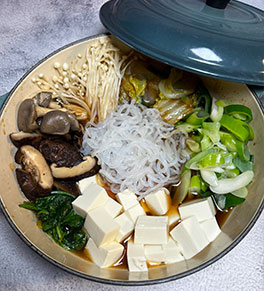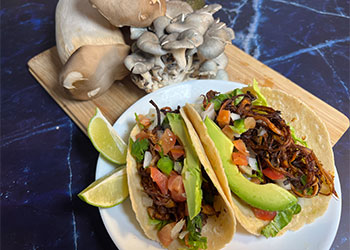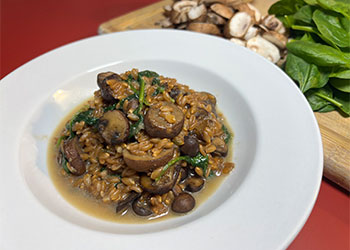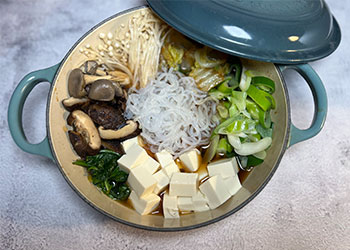Mushrooms: Savory disease fighters

Did you know that mushrooms are a superfood with powerful disease-fighting properties?
Salmon, flaxseed, nuts, avocado, whole grains, berries and vegetables are also superfoods and mainstays of a stroke-prevention diet. But mushrooms are unique in their ability to battle stroke from many directions.
Inflammation, high cholesterol and hypertension are major contributors to stroke. These edible fungi are low-sodium, low-calorie, fat-free and cholesterol-free. They’re also full of fiber, vitamins and minerals so important to a healthy diet.
Nutritional benefits vary depending on the type of mushroom, but they generally are rich in:
- Antioxidants. Stroke triggers a harmful cascade of chemicals that destroy brain cells. Antioxidants can reduce the damage and protect your body from free radicals that cause conditions like heart disease and cancer.
- Anti-inflammatory properties. Inflammation plays a leading role in damaging blood vessels that can lead to heart and cerebrovascular disease. It also worsens the neurotoxic toll of a stroke. Anti-inflammatory agents like mushrooms can help calm inflammation and repair its adverse effects.
- Beta glucan. This form of soluble dietary fiber has been strongly linked to improving cholesterol levels and reducing the risk of stroke and heart disease. It's also good at regulating blood sugar and reducing the risk of type 2 diabetes.
- B vitamins. The B vitamins, but particularly riboflavin and pantothenic acid, help produce red blood cells and oxygenate the blood. Pantothenic acid also benefits the nervous system and helps the body make the hormones it needs.
- Copper. This essential mineral also helps your body make the red blood cells that deliver oxygen throughout the body. It also is important for maintaining healthy bones and nerves.
- Potassium. This mineral is vital for heart, muscle and nerve function and it also helps lower blood pressure. Recent studies have shown that potassium decreases the risk of stroke, especially in women.
Studies show that mushrooms could even help protect against neurodegenerative diseases such as Alzheimer's and Parkinson’s," says Katie E. Rankell, a registered dietitian and program director of the UCI Health Weight Management Program. "Their high levels of polyphenols and other antioxidants are believed to help protect against mild cognitive impairment."
This month's meals, created by Jessica VanRoo, executive chef of the Susan Samueli Integrative Health Institute, part of UCI Health, serve up a wide variety of these stroke-fighting fungi so you can discover their healing magic.
Crispy wild mushroom tacos
 The humble taco is elevated to new realm when made with wild mushrooms, especially oyster mushrooms. There are about 40 types of oyster mushrooms, all of them edible!
The humble taco is elevated to new realm when made with wild mushrooms, especially oyster mushrooms. There are about 40 types of oyster mushrooms, all of them edible!
This recipe calls for regular oyster and king oyster varieties, which have a delicate, savory, almost seafood-like flavor when cooked. Regular oyster mushrooms have overtones of anise. But king oysters also have a deeper umami flavor in addition to notes of licorice.
Best of all, both varieties are full of ergothioneine, an amino acid that helps protect the body from cellular damage and lower inflammatory markers.
Jump to recipe ›
For a change of pace, try adding or substituting lion's mane mushrooms. They bring a seafood taste and texture similar to scallops, crab or lobster.
These large, white, shaggy mushrooms, which resemble a lion's mane, have gained considerable attention for their curative properties in recent years.
Research studies in animals have found that lion’s mane mushroom extract may help speed recovery from brain or spinal cord injuries by stimulating the growth and repair of nerve cells. They may also help reduce the severity of brain damage after a stroke.
Researchers are also examining their potential effects on Alzheimer's disease and other neurodegenerative disorders, as well as on depression and anxiety.
Taco Tuesday, here we come!
Mushroom and spinach farro risotto
 Cremini mushrooms — aka baby bellas — are like a gregarious friend that can adapt to any environment (or recipe) with their mild flavor. They are actually white mushrooms, one stage more developed. When fully grown, they're known as the larger, meatier portabella.
Cremini mushrooms — aka baby bellas — are like a gregarious friend that can adapt to any environment (or recipe) with their mild flavor. They are actually white mushrooms, one stage more developed. When fully grown, they're known as the larger, meatier portabella.
White mushrooms are also rich in glutathione and ergothioneine. Glutathione is both an antioxidant and a detoxification agent that helps eliminate potentially harmful substances from the body. Ergothioneine protects DNA from oxidative damage.
They also contain vitamin C and selenium, which enhance the immune system’s production of protective cells, including natural killer (NK) cells that hunt down invading cells as well as cancer cells.
"These mushrooms are super versatile," says Rankell, "They can be cooked in so many different ways and used as a side dish or the main course at any meal."
Jump to recipe ›
Pairing them with leafy green vegetables, such as spinach in this dish, provides nitrates and other nutrients that can help reduce the risk of stroke. When you eat leafy greens, your body converts the nitrates into nitric oxide, a molecule that plays an important role in regulating blood flow and blood pressure.Instead of rice, this risotto recipe calls for farro, an ancient high-protein, high-fiber ancient grain that is an excellent source of magnesium and zinc — essential for a healthy immune system and wound healing. It, too, is a great source of antioxidants and polyphenols that protect against stroke, heart disease, diabetes and some cancers.
This simple, hearty dish will surely bring soothing comfort at mealtime.
Sukiyaki with assorted mushrooms
 Sukiyaki is a dish prepared and served in Japanese hot pot style. Traditionally, it consists of thinly sliced beef or other meats and vegetables that are cooked together in spices and soy sauce, usually at the table.
Sukiyaki is a dish prepared and served in Japanese hot pot style. Traditionally, it consists of thinly sliced beef or other meats and vegetables that are cooked together in spices and soy sauce, usually at the table.
This recipe uses less meat and three types of mushroom — oyster, shiitake and enoki — supplying the umami punch, plentiful nutrients and fewer calories.
Jump to recipe ›
We covered oyster mushrooms in the taco recipe, so let's explore the other two.
Shiitake mushrooms are often described as having a smoky flavor and a buttery, meaty texture when cooked. They can be counted on to bring a bold intensity to any dish. They've also been a mainstay of traditional Asian medicine for thousands of years. Studies suggest that the polysaccharide lentinan they contain helps fight tumors by activating the immune system.
In Japan and China, an injectable form of lentinan is used alongside chemotherapy and other major cancer treatments to improve immune function and quality of life for people with gastric cancer. However, more human studies are needed before its use can be approved in the United States.
Enoki mushrooms are known for their slightly sweet, nutty flavor. Their texture is crunchy when fresh, becoming chewier the longer they are cooked. The biologically active components in enoki mushroom — dietary fiber and polysaccharides, especially mycosterol — have displayed an ability to reduce blood sugar as well as and lower blood pressure and cholesterol levels, including harmful low-density lipoproteins (LDL).
Combine these supercharged mushrooms with napa cabbage, spinach, leeks and silken tofu in a rich dashi broth and you have a delicious sukiyaki hot pot that will make your taste buds soar.
Related stories
Explore Further
Browse more blog posts by topic.




